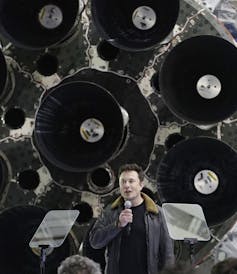If there’s one line that stands the test of time in Steven Spielberg’s 1993 classic Jurassic Park, it’s probably Jeff Goldblum’s exclamation, “Your scientists were so preoccupied with whether or not they could, they didn’t stop to think if they should.”
Goldblum’s character, Dr. Ian Malcolm, was warning against the hubris of naively tinkering with dinosaur DNA in an effort to bring these extinct creatures back to life. Twenty-five years on, his words are taking on new relevance as a growing number of scientists and companies are grappling with how to tread the line between “could” and “should” in areas ranging from gene editing and real-world “de-extinction” to human augmentation, artificial intelligence and many others.
Despite growing concerns that powerful emerging technologies could lead to unexpected and wide-ranging consequences, innovators are struggling with how to develop beneficial new products while being socially responsible. Part of the answer could lie in watching more science fiction movies like Jurassic Park.
Hollywood Lessons in Societal Risks
I’ve long been interested in how innovators and others can better understand the increasingly complex landscape around the social risks and benefits associated with emerging technologies. Growing concerns over the impacts of tech on jobs, privacy, security and even the ability of people to live their lives without undue interference highlight the need for new thinking around how to innovate responsibly.
New ideas require creativity and imagination, and a willingness to see the world differently. And this is where science fiction movies can help.
Sci-fi flicks are, of course, notoriously unreliable when it comes to accurately depicting science and technology. But because their plots are often driven by the intertwined relationships between people and technology, they can be remarkably insightful in revealing social factors that affect successful and responsible innovation.
This is clearly seen in Jurassic Park. The movie provides a surprisingly good starting point for thinking about the pros and cons of modern-day genetic engineering and the growing interest in bringing extinct species back from the dead. But it also opens up conversations around the nature of complex systems that involve both people and technology, and the potential dangers of “permissionless” innovation that’s driven by power, wealth and a lack of accountability.
Similar insights emerge from a number of other movies, including Spielberg’s 2002 film “Minority Report”—which presaged a growing capacity for AI-enabled crime prediction and the ethical conundrums it’s raising—as well as the 2014 film Ex Machina.
As with Jurassic Park, Ex Machina centers around a wealthy and unaccountable entrepreneur who is supremely confident in his own abilities. In this case, the technology in question is artificial intelligence.
The movie tells a tale of an egotistical genius who creates a remarkable intelligent machine—but he lacks the awareness to recognize his limitations and the risks of what he’s doing. It also provides a chilling insight into potential dangers of creating machines that know us better than we know ourselves, while not being bound by human norms or values.
The result is a sobering reminder of how, without humility and a good dose of humanity, our innovations can come back to bite us.
The technologies in Jurassic Park, Minority Report, and Ex Machina lie beyond what is currently possible. Yet these films are often close enough to emerging trends that they help reveal the dangers of irresponsible, or simply naive, innovation. This is where these and other science fiction movies can help innovators better understand the social challenges they face and how to navigate them.
Real-World Problems Worked Out On-Screen
In a recent op-ed in the New York Times, journalist Kara Swisher asked, “Who will teach Silicon Valley to be ethical?” Prompted by a growing litany of socially questionable decisions amongst tech companies, Swisher suggests that many of them need to grow up and get serious about ethics. But ethics alone are rarely enough. It’s easy for good intentions to get swamped by fiscal pressures and mired in social realities.

Technology companies increasingly need to find some way to break from business as usual if they are to become more responsible. High-profile cases involving companies like Facebook and Uber as well as Tesla’s Elon Musk have highlighted the social as well as the business dangers of operating without fully understanding the consequences of people-oriented actions.
Many more companies are struggling to create socially beneficial technologies and discovering that, without the necessary insights and tools, they risk blundering about in the dark.
For instance, earlier this year, researchers from Google and DeepMind published details of an artificial intelligence-enabled system that can lip-read far better than people. According to the paper’s authors, the technology has enormous potential to improve the lives of people who have trouble speaking aloud. Yet it doesn’t take much to imagine how this same technology could threaten the privacy and security of millions—especially when coupled with long-range surveillance cameras.
Developing technologies like this in socially responsible ways requires more than good intentions or simply establishing an ethics board. People need a sophisticated understanding of the often complex dynamic between technology and society. And while, as Mozilla’s Mitchell Baker suggests, scientists and technologists engaging with the humanities can be helpful, it’s not enough.
An Easy Way into a Serious Discipline
The “new formulation” of complementary skills Baker says innovators desperately need already exists in a thriving interdisciplinary community focused on socially responsible innovation. My home institution, the School for the Future of Innovation in Society at Arizona State University, is just one part of this.
Experts within this global community are actively exploring ways to translate good ideas into responsible practices. And this includes the need for creative insights into the social landscape around technology innovation, and the imagination to develop novel ways to navigate it.

Here is where science fiction movies become a powerful tool for guiding innovators, technology leaders and the companies where they work. Their fictional scenarios can reveal potential pitfalls and opportunities that can help steer real-world decisions toward socially beneficial and responsible outcomes, while avoiding unnecessary risks.
And science fiction movies bring people together. By their very nature, these films are social and educational levelers. Look at who’s watching and discussing the latest sci-fi blockbuster, and you’ll often find a diverse cross-section of society. The genre can help build bridges between people who know how science and technology work, and those who know what’s needed to ensure they work for the good of society.
This is the underlying theme in my new book Films from the Future: The Technology and Morality of Sci-Fi Movies. It’s written for anyone who’s curious about emerging trends in technology innovation and how they might potentially affect society. But it’s also written for innovators who want to do the right thing and just don’t know where to start.
Of course, science fiction films alone aren’t enough to ensure socially responsible innovation. But they can help reveal some profound societal challenges facing technology innovators and possible ways to navigate them. And what better way to learn how to innovate responsibly than to invite some friends round, open the popcorn and put on a movie?
It certainly beats being blindsided by risks that, with hindsight, could have been avoided.![]()
Andrew Maynard, Director, Risk Innovation Lab, Arizona State University
This article is republished from The Conversation under a Creative Commons license. Read the original article.
Image Credit: Fred Mantel / Shutterstock.com



